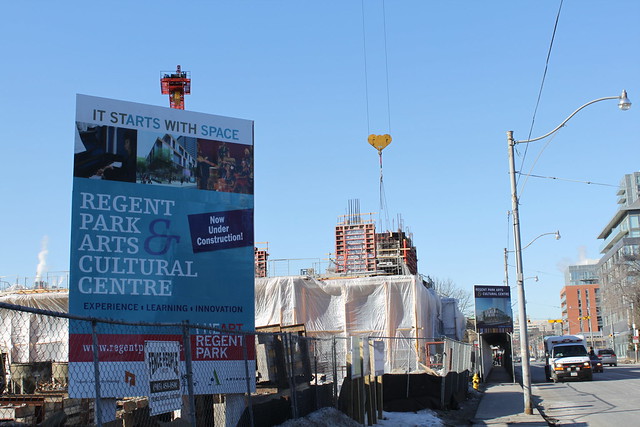

Lost amidst all the bleating about chocolates and pedicures and heads bouncing across Nathan Philips Square is a question I hope Jeff Griffiths, the city’s even-handed auditor-general, will ask himself as he proceeds with the TCHC audit.
To what extent was the TCHC’s allegedly spendthrift culture an outgrowth of the fact that the agency, in recent years, was behaving much more like an ambitious property developer than a responsive property manager?
I don’t know the answer, but it’s a point that certainly should be pursued if the mayor and council want to get to the core of what ails the TCHC.
Anyone who’s watched TCHC during the past decade knows the agency was institutionally pre-occupied, at the highest levels, with the sweeping revitalization of Don Mount, Regent’s Park, Lawrence Heights and other TCHC properties.
In the amnesia-afflicted culture at City Hall these days, it’s worth remembering that such redevelopments were all about leveraging valuable city-owned land and private capital to build market-based condos, the sales of which would subsidize the renovation or replacement of the TCHC’s most derelict apartment complexes.
This formula — widely used in other large cities with crumbling but well-located public housing projects — was just the sort of thing Mayor Rob Ford claims to value: the use of private sector partnerships to reduce public spending. (He campaigned against Lawrence Heights, suggesting he doesn’t get the math.)
But property development is a very different game than what TCHC hastraditionally done (i.e., maintain buildings, deal with tenant issues, process applicants, and provide programming to residents). With these multi-million dollar revitalization schemes, TCHC officials had to venture into the mine-field of the planning world, which involves complicated re-zonings, extensive public consultations, political and media outreach, and dealing with the building industry.
Effective development, of course, demands both schmoozing and speed, so it is not a stretch to imagine that the TCHC’s senior managers — energized by an obviously challenging mission — may have become more than a little impressed by the urbane ways of the city’s building industry. After all, the perks and procurement short-cuts unearthed by the auditor-general wouldn’t be out of place in the development industry, where time-to-market is a major competitive issue.
Incent your employees to deliver projects on time and on budget? Check.
Go with a supplier that says it can get the job done faster? Check, check.
I’m not excusing the conduct, but we can’t ignore the wider context, either.
It also seems relevant that TCHC and the City of Toronto often worked at logger-heads as the agency pressed ahead with its plans, especially on Lawrence Heights. TCHC officials bridled at the procedural road-blocks thrown up by the city’s planning bureaucrats. And perhaps this institutional rivalry helps to explain why the agency’s managers seemed so obtuse to the ultra-cautious mindset (yes!) that came to characterize the city’s corporate culture in the post-Bellamy inquiry period.
Okay, but so what?
As other commentators have noted, last week’s TCHC scandal should present council with an opportunity to re-think the city’s affordable housing policies and its management of the TCHC portfolio in particular. Certainly, the city should be asking whether the TCHC’s split corporate personality is sustainable, or whether the re-development functions should be handled by another agency, like Build Toronto.
The mayor, in coming weeks, will install new (and, I’m guessing, paler) directors and an obedient CEO. Ford has often talked about creating a voucher system — such as the Section 8 “housing choice” system in the U.S. — and last week also blustered vaguely about privatizing whole show.
Even with a malleable board, I am not convinced the brothers Ford have the political stamina to see through such a massive and tangled exercise — after all, evicting 160,000 low-income families from their apartments would give Joe Fiorito enough sad stories to last several lifetimes. And heaven knows the Ford administration has plenty of other monumentally complicated tasks on its agenda (outsourcing everything, the Sheppard subway, the budget, etc., etc., etc.)
In some ways, last week’s melodrama reminded me of the infamous moment during the 1997 election campaign when Mel Lastman assured voters there were no homeless people in North York. Within days, as Adam Vaughan duly reported, a homeless woman turned up dead beneath a bridge in the city with heart.
After he was elected, Lastman, who was a much more deft politician than Ford (I can hardly believe I’m writing that line), named Anne Golden to head up a homelessness taskforce that produced a useful slate of reforms for council to implement. Lastman’s mayoralty was more successful as a result.
Looking over the TCHC mess that Griffiths helpfully deposited at his feet, Ford could, in theory, take a page from Mel’s playbook and seek out some informed policy advice instead of barreling ahead with his content-free threats. Indeed, Giorgio Mammoliti already did some of the analysis during the last term of council through the affordable housing committee, which he chaired.
When Mammolitti’s housing opportunities “action plan” [PDF], chock-a-block with solid recommendations, came up for a vote in August, 2009, council’s stalwart conservatives (Mike Del Grande, Doug Holyday, Denzil Minnan-Wong, Karen Stintz, John Parker) backed the strategy.
Ford, of course, voted against it.




8 comments
You provided some interesting insights; Do we want “ghetto”ised pockets of social housing? We tried the Regent Park experiment and are rebuilding.
Toronto wants to be world class, yet continues with deferred maintenance issues of its own as Toronto’s largest single landlord.
Rent Subsidies have merit where a “chit” or direct pay system place those less fortunate inside the community. There are condos that could be rented, I see Room for Rent and Apartment for rent signs often in my travels.
Market rent is the issue; A two bed two bath high rise in DT Toronto will yield a landlord $16 to $1800 per month. Toronto housing groups seem to feel that rents should stay in the $ 400 to $800 range.
I liked Mammoliti’s analysis. But we will study for another 20 years before doing anything. We need leadership and decisions now.
http://www.toronto.ca/legdocs/mmis/2009/ex/bgrd/backgroundfile-21572.pdf
We could do so much more and we have an aging issues (growing seniors demographic) that all these reports and studies are silent about.
David Pylyp
Accredited Senior Agent
Living in Toronto
I have been appalled (but not shocked) by the media’s overwhelming concentration on the chocolates and Christmas party which are, in the large scheme of things, very small change, while usually ignoring the issue of procurement. Lazy reporting and easy headlines.
While a “can do” attitude may be typical of the private sector, one must still wonder about things like contract splitting whose clear purpose is to circumvent and hide what is going on. If a company really wanted to get on with the job, it would have an approval mechanism that facilitated this rather this, but on a responsible basis, rather than turning a blind eye to less-than-arm’s-length dealing.
The whole MFP mess and the recommendations of Justice Bellamy turned on a procurement process that was out of control and subject to back channel influence. It’s so well timed that a well known lobbyist has come out of the woodwork to haunt us again. If the Brothers Ford really care about integrity, they will check what he and his ilk are up to.
Wow! Talk about not seeing the forest for the candy wrappers. It’s amazing how many layers of blinders some people are willing to put on so that they can just see this as a matter of a little overspending on a little bit of pampering for employees (column by Hume in today’s Star). Adherence to procurement policies is a very serious issue. As are what apparently efforts to make deep-six public oversight by making end-runs around Board.
Many issues to be discussed here. I think first and foremost, is it sustainable for the City in the long run (20-30 years) to continue providing housing in the downtown core at half to one-third the cost of the market rate? Should the city look at maximizing their dollars for the subsidized housing services? i.e. For $1 million, would you rather provide 1500 units for people to live in downtown or would you provide 2500 units for people to live outside the core instead? How about the opportunity cost to the city of providing the subsidized housing in the core? Instead of collecting full property tax rates/revenue in the core from mixed uses, they are providing subsidized housing where the tenants really pay nothing. Sure, there would be huge inequalities locating those in need of convenient transportation outside of the core where we know transportation isn’t good but is it really working any better now?
US cities have vast experience with housing authorities, redevelopment of public housing and rent stabilization issues. Ford, or someone on his team with an attention span greater than a toddler, should study these carefully so as to learn from the successes and avoid the failures.
Just to give one example, this was a terrific fix of a classic public housing complex:
http://landonbonebaker.com/housing/rehab/archer-courts-phase-1/
@tj There are benefits beyond those accrued to economic man to be had by making sure the city core has a mixed population. I feel NYC has lost much in driving the rich pot of poor and immigrants from Manhattan. Toronto is doing it too by pricing housing beyond the lower income people and driving the manufacturing jobs (ha!) to the suburbs but I think in the long run this will change as the condos peppering the core disintegrate from poor materials, bad design and shoddy construction, bringing their (by then rents) down.
I believe the Ford cartel’s only intention in this 4 year term will be to open the doors to whatever the developers want, including tearing down TCHC units if there is time. This unfortunate audit has presented a golden opportunity to strip the board and replace it with compliant Fordites. Lost will be the tenants.
Very perceptive article, John, and precisely nails the dilemma faced by TCHC. On the one hand, they were given a mandate to be more entrepreneurial, raise private capital, and act like developers — and they appear to have been remarkably successful, raising over $500 million in private funds for public projects. But they also saddled themselves with spending policies designed for stand-pat government departments. Something had to give. If the goal of public agencies is to “do good” rather than “make no mistakes,” my guess is that, taken altogether, the City and tenants have been the gainer by TCHC’s recent style. Time will tell.
I too see this as an opportunity to re-think public housing. But if the only outcome is to strip the downtown of its last affordable units, as TJ suggests, and move them to the circle of poverty that rings the core, we’ll have done this City a terrible service.
Case OOTES! I rest my case. This is a golden opportunity for Ford to sell off the assets of the TCHC to the ones who brought him to power – you know who they are.
CASE OOTES. Next thing you know Tom Jacobek will be running an ethics commission investigating David Miller.
And Mr. Jacobek was very involved in this last election, particularly in his old riding so I expect to see his name pop up soon.